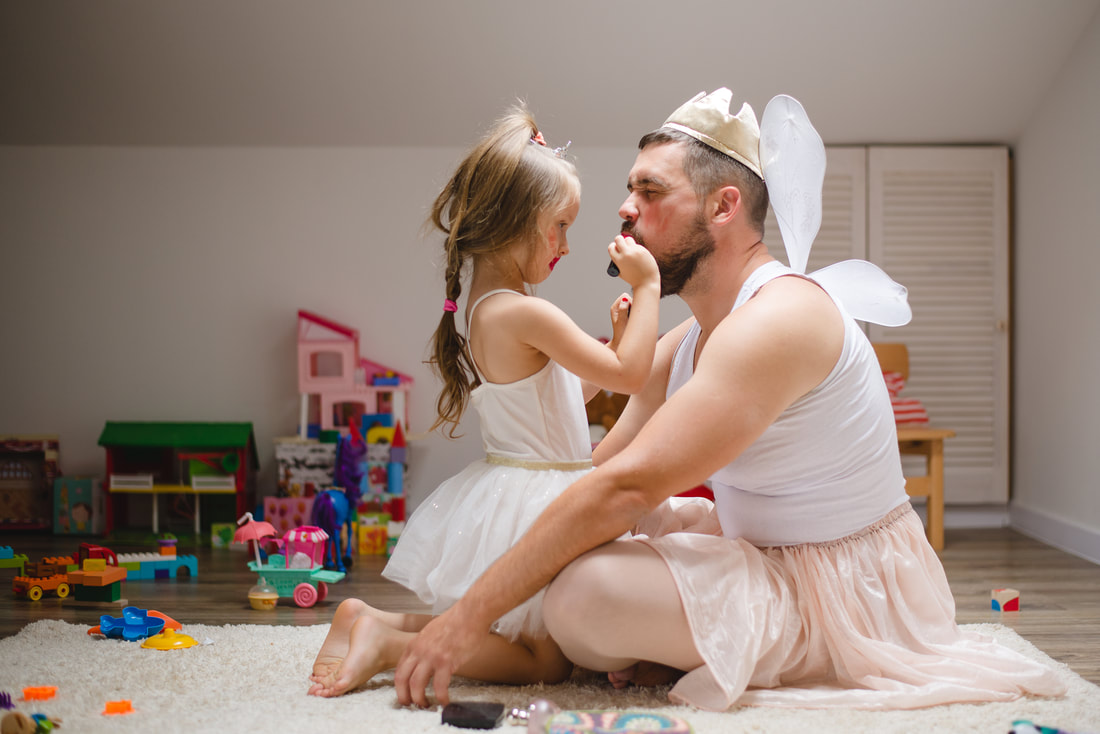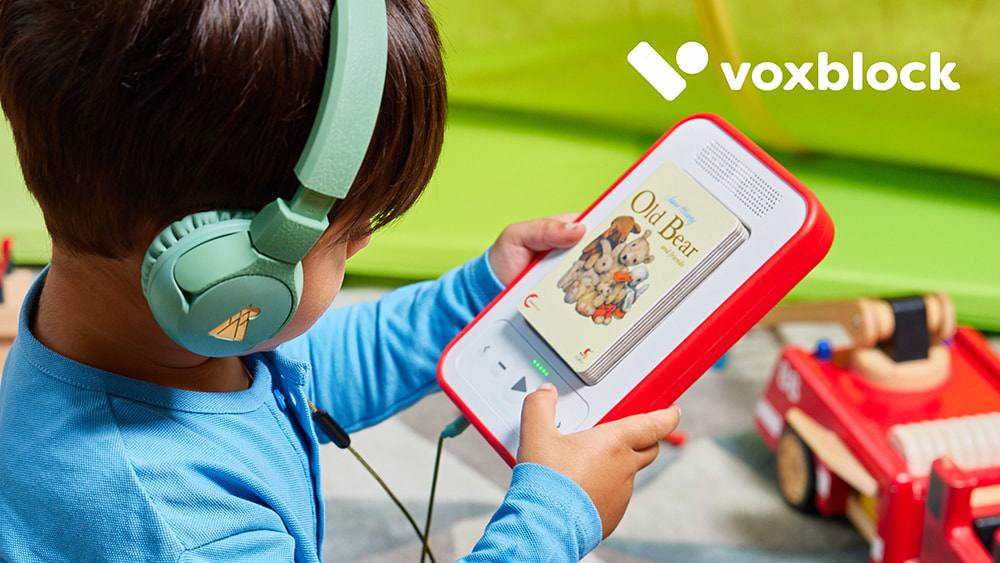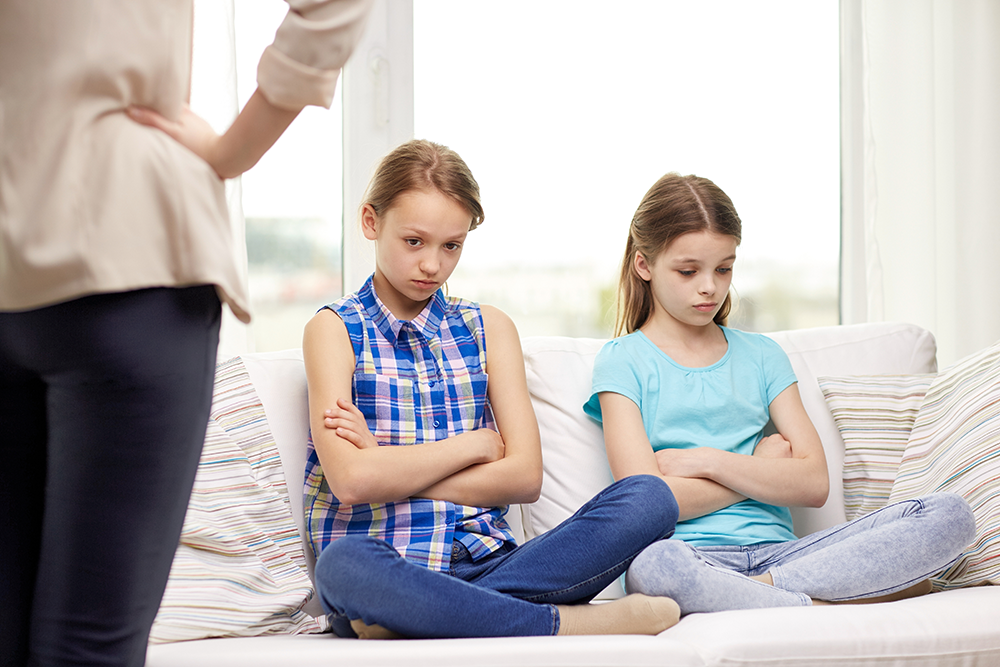by Heidi ScrimgeourNo-one wants to raise a spoiled brat, but sometimes we’re all so set on NOT spoiling our kids that I think we can overlook the fact that an occasional treat - whether it’s an ice-cream before dinner or staying up past bedtime once in a while just for fun - can do wonders for a child’s sense of self-worth. Not that kids should take their value from sugary treats and late nights alone, of course, but the right kind of spoiling can help create memories that last a lifetime, too. So here are four ideas for spoiling your kids… because they’re worth it!
by Heidi Scrimgeour We might never tell you this; but sometimes we go weak at the knees just watching you in action with the kids. From the way you mucked in (pun intended) with your fair share of newborn nappy duty to all the silly stuff you do to make the kids laugh, we appreciate you so much more than we might always let you know. So, in honour of upcoming Father’s Day,here are five reasons why we’re glad that you’re the Daddy…
Funny is an aphrodisiac, you know… We love it when you lark around with the kids. Yes, we know it might not seem like that when we’re moaning at you for getting the kids all wound up right before bedtime yet again, but we’re secretly in awe of your capacity for fun. The kids adore you for it and yes, we admit it, it makes us feel sort of strange and gooey when we think about how you’re teaching our kids to laugh lots and enjoy life. Maybe you could teach us a thing or two about how you do it, sometime? Just please, not right before their bedtime… My friend Tiffany’s husband has the silly stuff down to a fine art. “He sings and dances to all the songs from Frozen during family tea time,” she says proudly. “It’s like dinner theatre at our house every night.” Yep, that’s exactly what we’re talking about. Keep up the good work, Dads. “I love the way the Dads I know are generally so good at being a big kid along with the kids,” agrees mother of two Sonja. “As Mums that fun stuff is something that we don’t always seem to have the time for. My daughter Annabelle even calls her dad her ‘play-area’!” Daddy knows best (sometimes) We admit it, as mums we don’t always make time to answer the kids’ questions or explain all the little things to them about the world that really interest them. So we love it when you take time out to get down on the children’s level with them. My friend Kate reckons her husband, Kenny, is the best dad in the world at this. “I love watching him share the pure joy of their innocence, and seeing him join in with their sense of wonder at the world,” she says. “I love it when my partner engages our girls in stuff that wouldn’t ever cross my mind,” says mum of two, Gemma. “Like science experiments in the shower, spotting the phase of the moon, and working out how stuff works.” Being a great role model All kids need role models, and there’s nothing quite as heart-warming for a mum as the knowledge that their kids have a father figure worth looking up to. We know you’re not perfect, but all the stuff you do to set an example to our kids really means the world to us. You might think you’re ‘just being a dad’ but we think you’re going the extra mile, and that matters. My friend Rachel split from her little boy’s father and met her new partner when her son was just two. They’re now the best of friends, and she loves the wholehearted way her new hubby has taken on the step-dad role. “The best bit about their relationship is the unwavering support he shows my son; emotionally but also when it comes to discipline, plus being a role model and the all-important business of helping to keep him fed, clothed, warm and happy.” Teaching the kids to gang up against Mum Let’s get one thing straight, we are NEVER going to admit this to you in front of the kids, but you know those times when you roll your eyes in our direction with the kids, or gently encourage them to gang up with you against us? We might act exasperated but secretly? We love it. My friend Estelle has three kids, and points out that being a great dad isn’t always about a biological role. “My partner Shane is a wonderful stepdad, and regularly spends more quality time with my youngest than I do these days,” she says. “He’s the one tucking her in - which usually means larking around doing puppet shows with the soft toys - and they definitely get together to gang up on me sometimes. And yes, I love it. Sometimes the biological link can be much less important than the love and care that good dads lavish on their kids.” Lightening the load From pulling your weight with night feeds to taking the kids to the park so that we can go for a long, luxurious soak in the bath alone, we love you for all the ways you offer your support to us, as well. Mum of two, Gail says her husband was a wonder when their kids were little. Not only did he regularly take their boys off on fishing trips or to the park to play football so that Gail could have a breather, but he showed “endless patience” with their kids too, she says. We might not always acknowledge that you’ve got those kind of qualities by the bucketload - which we might lack - but we do notice it, and we think you deserve more credit. But my friend Hazel, who has two little girls, reckons she’s married to the best dad in the world. When I quizzed her as to exactly what he gets right and how other fathers could seek to replicate his winning ways, she trotted out a list of things he does, from cooking for the kids and taking the trouble to notice what they really like to eat, to making them beds and swings from scratch and teaching them how the garden works. “What’s funny is that it’s actually difficult to think of ALL the things he does that make him such a brilliant dad, because there are so many that I sort of take it for granted and think he’s just an ordinary dad,” she says. “But actually, that in itself speaks volumes and shows what an extraordinary father he is to our girls.” Which got me thinking; the secret to being a brilliant Dad is never going to be a one-size-fits-all-formula. What makes you amazing is all the little things you do for our kids and to help nurture and protect our family. No-one else can do that better. Why spending more time on your needs, rather than your children’s, can make you a better parent2/29/2024
by Louis Weinstock I'm sure you’ve already read many articles about how our young people are becoming ever more narcissistic. ‘Generation Me’, as psychologist Jean Twenge calls it, are apparently more entitled and more obsessed than ever with image than previous generations. And there is some good research to back up this claim.
The word ‘narcissist’ comes from the ancient Greek myth of Narcissus. He was a handsome boy who fell in love with his own reflection and got sent to the underworld. The lesser known side-kick of this story is the nymph Echo, who falls in love with Narcissus but has no voice of her own and can only repeat what Narcissus says. If our children are growing up more narcissistic, then it is we parents who are becoming like Echo, losing our own voice and losing touch with our own needs. As parents, if we can spend a little more time on our own needs, rather than our children’s, it makes us better parents. What a paradoxical thought! Hear me out. In researching my book - How The World Is Making Our Children Mad, And What To Do About It - I interviewed David Lancy, an anthropologist of childhood. He told me of other cultures where parents do not focus on their children in the same way we tend to in the West. For example, in rural Liberia, Kpelle mothers carry their babies on their back most of the day while they work and socialise but they hardly pay them any attention. Meanwhile, children in Fiji from as young as four are expected to bow very low and avoid eye contact when passing an adult and may get a clip round the ear if they don’t show enough respect. In contrast, Lancy calls modern Western cultures ‘neontocracies’, where we plough so much of our time, energy and resources into our children, leaving parents as Echo and the elderly getting a particularly rough deal (off to the care home for you). When I learned from Lancy about the different type of attention some children got in other cultures, the almost obsessive energy and attention we pour into our children in the modern Western world suddenly seemed strange, laughable even. Hearing about these other ways of parenting, I felt as if someone had taken my heavy sack of parental guilt, laid it down by the side of the road and said to me: ‘It’s OK, Louis. You can focus on you without feeling guilty.’ Now, it’s really important to say that the mothers I learned about in other cultures did not completely ignore their children. They were still responsive to them, fed them on demand and kept them in close physical contact (‘skinship’). But, importantly, their lives didn’t bend to the every whim of their children. This is not to say that some of the popular parenting models in the West, such as attachment parenting, have got it all wrong. If we want our children to develop a secure attachment, we need to be warm and responsive. But there is a clear risk that in spending so much energy on our children, we are creating an expectation that the world revolves around them, when in fact, the world is not designed to perfectly meet our children’s every need. When we raise children who have too much of a sense of being special, at some point their sense of specialness comes into contact with the real world. In my primary school, I was really good at swimming. I easily won the breaststroke races. I thought I was the bomb – Michael Phelps in disguise. But then I went to a much bigger secondary school and there was a boy who was miles better than me. B*****d. For a while, that really dented my pride. In my practice, I often see children who’ve developed quite bad mental health issues after the transition to secondary school. They aren’t prepared for becoming a smaller fish in a bigger pond. Now, let’s extend this reality to a very big pond – the world of social media. Here, a child comes into contact with billions of other potentially ‘special’ people. And this contact reveals a fundamental and painful truth: 99.9 per cent of the time there is no special treatment awaiting them. A self-image based too much on specialness is fundamentally fragile. We need to prepare our children for a world where the spotlight simply won’t be on them all the time. And even when it is, spotlights can burn and blind; pop stars are up to seven times more likely than the general public to commit suicide. And there is a more obvious point here. When parents don’t take care of themselves, they burn out, losing the energy required to be a good parents. An article in the Atlantic, called ‘The Perils of Attachment Parenting’, put it like this: ‘When parents begin a pattern of meeting their child’s every need at the expense of their own, it sticks. It’s hard to pop out of that mindset when your six-year-old wants another cup of milk even though you’ve just sat down for dinner or when your 10-year-old is eager to add yet another activity to his schedule that would require you to drive across town at rush hour.’ If you want your children to grow a capacity for care and compassion for themselves and others, first you must fill up your own cup. This is self- compassion – when we treat ourselves the same way we would treat a beloved friend. This may sound obvious. But how consistently do you do it? I am here to give you extra permission and encouragement. Buddha once said that you could search the whole world and not find anyone more deserving of your love and compassion than yourself. Let that sink in for a moment. A 2020 review of self-compassion for parents showed that it consistently reduces depression, anxiety and stress in parents. A recent study of over 900 Dutch families showed that parents with less self-blame had teenagers with fewer symptoms of depression and anxiety. It is not always as easy as just deciding to focus more on our own needs. Sometimes, parents have grown up in environments when focusing on other people’s needs was the way they kept safe. But with practice, anyone can learn to break these patterns. Just choose one small way today that you can take better care of your own needs, and keep building from there, one small self-caring step at a time, loving nursing Echo’s voice back. By Gavin Oattes TWENTY TWENTY FOUR! TWO THOUSAND AND ACTUAL TWENTY FOUR.
It feels like the future. I still remember when we all sang about meeting up in the year 2000! My 12 year old daughter thinks of the 2000s the same way I thought of the 1970s, and the 1970s the way I thought of the 1940s. According to the movies I watched growing up, we should have flying cars by now. 2024 though! Of course, it’s only appropriate that I wish you all a very Happy New Year…whatever that even means these days?! Happiness is such a strange and broad topic. I think I’d probably rather wish you good health and peace of mind. With the nature of my business and my books, at this time of year I am always asked about my new year resolutions. It’s assumed that I partake in a gigantic goal setting exercise that will inspire me for the months ahead. New year = New you, right? Nope! I used to be right into this thinking. I took it mega seriously. I would stand there at midnight, fire in my belly, firmly believing this was going to be my year. This was going to be the year it all happens, fame and fortune await! It never really was my year though. Because that’s not how life goes. Every year is just a big loop of ups, downs, magic, sadness, happiness, frustration, wins, losses, good, bad, and good again. By the time you read this, most resolutions set will now be well and truly unset! Only about 16% of people succeed with their new year’s resolutions. 16! Why is that? Perhaps it’s pressure? Obligation? A bit of the old bandwagon going on? Maybe people are scared? Worried about other’s opinions? Some fear of failure, or even success? Maybe we got a wee bit excited and set the bar too high? Maybe we don’t value our health as much as we should? Maybe we don’t really know why we’re doing it? But here’s the interesting thing… You are more likely to achieve your goal if you make it about what you want to achieve today. Instead of planning for how you want to feel in a year, or five years, plan for how you want to feel now. Don’t Wait We are forever asked questions such as: Where do you see yourself in 5 years? What do you want to have achieved in life by the time you retire? It’s all very future focussed. The challenge with the 5 years/10 years type of questioning is that ‘you’ 5/10 years from now will be a very different ‘you’ to right now. It’s hard to guess what will make us happy in 10 years, but I’m willing to bet though you know what would make you happy right now. Traditional goal setting is all about the future. Set a huge goal and break it down into manageable chunks. Start at the begging and then lay it all out step by step, blah blah blah. Goal setting can be extremely beneficial, but it can suck the joy out of the journey to the thing that’s meant to make us happy and fulfilled. The best example of this for me is my time doing comedy. Rather than enjoying the present, I was becoming too wrapped up in what’s next. In ‘making it’. What’s bigger? What’s better? Would I rather be on that stage, giving it my all, completely and utterly in the moment, feeling great and not get a 5 star review? Or, be so laser-focused on getting a 5 star review that I lose sight of everything else, stressing myself in the process and not enjoy the performance at all? Now when I’m on stage, my goal is simple; give it my best on that day and come off stage feeling good enough to want to do it all again tomorrow. Too many of us spend our days feeling discouraged, tired or unmotivated from chasing an endless stream of goals that seem a long way away, so maybe it’s time to re-examine the order of things. Or more so, our timescales. So, let me tell you about reverse goal setting, why it’s great and more importantly, how we do it. This is about gaining a different perspective. Flipping the traditional on its head and seeing things through a slightly different lens. Reverse goal setting is less about ‘making it’ in the old school sense and more about working out a path for yourself that is actually fulfilling, right now. Simply ask yourself 3 questions. 1. What do I want to feel right now? 2. What activity can I do right now to give me that feeling? 3. If I do this activity regularly, what results would it create? Let me give you an example. You might say right now, “I want to feel healthier”. Ok, what activity allows you to do that? A 30 minute walk outdoors always leaves us feeling better both mentally and physically. So, today, have a 30 minute walk round the block. If you did this every day for 6 weeks, what sort of result would that create? It would create a healthier, happier you right from the off! So, if you want to be a healthier, happier you, then commit to do something that builds momentum. Before you know it, a 30 minute walk might turn into a 60 minute walk. It might even turn into a run… Here’s another example. You might say, “I want to feel more relaxed”. Magic! Today, what activity could make you feel relaxed? You might say, “15 minutes of mindfulness makes me feel relaxed, every time I do it, it chills me out a little.” Awesome. So, if you do 15 minutes of mindfulness every day for the rest of your life, what sort of results would that create? There’s going to be a far less stressed you walking about and who knows, you might just become a mindfulness master in the process! Don’t wait to truly start living. You can feel the way you want to feel today. No more constant chasing, wishing and hoping for stuff that feels like a lifetime away. Right now, choose the feelings you want to feel, find the activities that give you these feelings and do them. That’s it. 3 simple steps. Boom! The Power of Audio Stories: Boosting Children's Literacy and Imagination
From timeless tales of adventure to heartwarming bedtime stories, literature has been an essential part of a child's upbringing for generations. But in today's digital age, where screens dominate, the way children engage with stories is evolving. One remarkable evolution is the rise of audio stories, and they come bearing a treasure trove of benefits for young minds. According to research by the National Literacy Trust, listening to audio stories can significantly enhance children's literacy skills, and Voxblock, the screen-free audio player, has been leading the way in this literary revolution. By Heidi Scrimgeour Say sorry or we’re going home right now,’ I hissed, my cheeks turning redder with every awkward second that ticked by.
Predictably, silence followed. You can guess what happened next. Not five minutes into our much-anticipated day out at the park with friends, I was marching my three year old home on account of his stubborn refusal to apologise for repeatedly snatching his friend’s beloved toy. by Richard Templar The Rules of Parenting brings together over 100 Rules for bringing up happy, confident children. Not instructions but guidelines, based on observations of what actually works. Fans of the book were recently asked to vote for their top 10, so here’s a preview of those Rules that parents who have read the book swear by most…
Movies are a fantastic way to keep children entertained, but from as early as 19 months, kids can begin to copy what they see in others, which is why it’s crucial that caregivers expose them to positive content. Here we look at seven classic and modern film characters who serve as fantastic role models for kids. Grab the snacks and kids’ pyjamas because you’ll want a movie marathon after this!
1. Riley (Inside Out) Inside Out first premiered in 2015 and follows the life of Riley, an 11-year-old who is forced to embrace a new life in San Francisco after leaving everything she knows behind in Minnesota. Her actions are controlled by her five core emotions: Joy, Sadness, Fear, Disgust, and Anger. Riley’s character is a great role model for kids because she demonstrates resilience; she goes through a huge life change and is forced to learn how to deal with the consequences of this. The role her emotions play teaches children that it’s OK not to feel joy all the time and that all feelings need to be embraced. 2. Charlie (Charlie and the Chocolate Factory) Nobody inspires children quite like Charlie Bucket! Created by British novelist Roald Dahl, Charlie and the Chocolate Factory was originally published in 1964 before being adapted for the screen – first in 1971 and then again in 2005. Viewers can join Charlie, a sweet little boy caught up in a life of poverty, on a highly anticipated tour of the famous Wonka Factory. Charlie is an incredible role model to little ones because he demonstrates kindness, patience, and optimism despite the awful challenges life continues to throw at him. His grandparents are bedridden, there’s never enough food to go around, and he’s forced to sleep on the floor. For many, this type of life would turn us bitter and cynical, regardless of age, but Charlie never loses positivity. 3. Mirabel (Encanto) This 2021 film was both a commercial and critical success, earning over £200 million at the box office and receiving widespread critical acclaim. Encanto itself boasts several impressive features, but it’s the characters who captivate the audience the most – specifically, Mirabel. Your children can look up to Mirabel, the film’s protagonist, because she’s determined, forgiving, and very family-orientated despite feeling like an outsider. When danger is brought upon the family miracle, Mirabel – who received no magical powers like the other Madrigals – risks everything to protect it. 4. Po (Kung Fu Panda) Although Po is a panda, he still represents everything that’s good in somebody, and your child should be encouraged to adopt Po’s most endearing qualities. Despite his clumsiness and the fact that the wider kung fu community (initially) refuses to accept him, his unwavering enthusiasm helps him persevere. Po shows us that it’s perfectly fine to do things a little differently and can be seen to encourage young children to find their own way in the world. He was presented with challenges at first, but in the end, he fulfils his destiny and becomes a true hero. 5. Luna Lovegood (Harry Potter) If you want your little one to grow up brave, independent, and with a strong sense of self, you should expose them to Luna Lovegood’s character in the Harry Potter film series. This wonderful character doesn’t appear until the fifth instalment of the franchise (Harry Potter and the Order of the Phoenix, released in 2007), but a Harry Potter marathon is never a bad idea. Luna is proud to be different, and she doesn’t let anyone else’s opinions or judgements get in the way of being her true, authentic self. Sure, she’s seen as a little weird and quirky (‘Loony Luna’), but she refuses to apologise, nor does she try to change herself to fit into society’s expectations. 6. Matilda (Matilda) Another work of art from Roald Dahl, Matilda is a timeless classic that can still delight its audience 26 years after its premiere. The character of Matilda is a remarkable idol that all children should aspire to be like. Although she spends her entire young life being neglected by her awful mother and father, Zinnia and Harry Wormwood, she retaliates against the abuse and works hard to create a new, happier life for herself. Matilda takes charge of her education, reading countless books despite her family’s relentless taunts and lack of effort to understand, and then demands she be sent to a real school to further her learning. She is strong, determined, and teaches young people that it’s never okay to be bullied and manipulated. 7. Peter Parker (Spider-Man) Is there anyone more inspiring than a superhero? Spider-Man was first introduced to the world in 1962 as a comic-book character, and since then has been the main character in nine different films. Both Spider-Man and Peter Parker (the young man who becomes the superhero after receiving a bite from a radioactive spider) are striking role models for kids. Peter Parker is a true hero because he continuously sacrifices his own well-being for the greater good of the community. As superheroes typically do, Spider-Man teaches young children to be brave and selfless, and that it’s okay to struggle under tremendous responsibilities. What matters is that you try your best. ν Feature source: Cath Kidston https://www.cathkidston.com By Gavin Oattes Need, Need, Need, Need, Need…
I remember as a young kid being obsessed with sticker albums. It was so exciting when my dad brought home the latest one, the buzz of going to the wee shop to get packets of stickers, only to tear them open was just pure magic. The goal was always to fill the album as quickly as possible, so I was first to be able to say “completed it!”. The race was always on. We would spend every ounce of our pocket money, no matter how little we had, on those stickers. It’s an expensive business! More often than not, it was football stickers. I don’t even like football. But like millions of other wee kids, I was obsessed with collecting these sticky treasures. From the highs of finding a ‘Shiny’ to the crushing lows of discovering your pal had a ‘doubler’ of the sticker you needed most, but wouldn’t do ‘swapsies’ with you. It had it all. Every day at school and every day straight after school; need, need, need, need, need, need, need, need, need, need, need, need, need, need, need, need, need, need, need, got, need, need, need, need, need, need… I never completed one. Ever. Very few people do. Like many things growing up, it’s usually a short-lived fad. Or we keep getting the same stickers, the ‘swap’ pile grows exponentially, and we lack the highly sought-after glittery ones. It can get repetitive, frustrating, boring even, we get distracted, jealousy creeps in, others get there first, they’re collection is bigger, better, and their parents buy them more, so we move on to something else. There were always rumours that someone had completed it. Never saw any proof so in my head it didn’t happen. I reckon no one ever truly completes a sticker album. I really wanted to though, more than anything, was that too much to ask? So often I wished I’d never started! The attic in my mums house most likely has a box of nearly completed sticker albums. Everything from World Cups to Transformers to the Olympics. I even had the Neighbours album, none of them full. Sounds a bit like life, no one ever completes it. It’s like the internet, you can’t finish it, there’s simply too much to do, too much to see. Yes, life is full of glittery prizes but there’s just too many “shinies” to collect. And it always feels like there’s someone who has nailed it and has it all. They’ve ‘completed it!’ But that’s part of the problem for so many. It’s always been the problem. The race is on, a constant search for the big prize of being first, constantly seeking the glittery moments, craving what others have, the dream car, the promotion, the mansion, prepared to swap it all just to be the first to say “completed it”…and then probably post it on Instagram. Need, need, need, need, need, need, need, need, need, need, need, need, need, need, need, need, need, need, need, got, need, need, need, need, need, need… In life, the things we think we need are usually things we want. We really don’t need very much. The only finish line in life is death and I’m not sure about you but I’m definitely not keen on finishing. There’s so much to learn and so much to do, you can’t possibly do it all. By all means, ram your life full and live life to the max but one of the biggest lessons we can learn is to be grateful for what/who we do have rather than spend all our time thinking about what we don’t have. I’m just like you are. I enjoy collecting experiences, new memories and making new friends. But if you’re one of those types, always chasing the next big shiny prize, then there’s no shinier prize than your happiness. And we all know the things that make us happy aren’t things… Life isn’t for completing. And it’s not for competing. It’s for living. Here’s to being happily unfinished. By Heidi Scrimgeour Dreading the school hols? Or looking forward to ditching the school run and enjoying life at a slower pace? Whichever camp you’re in, here’s our guide to surviving the school summer holidays...
Let’s not beat around the bush - many mums and dads quietly dread the school summer holidays. From the question of how on earth to keep the kids entertained (especially if the weather fails us - please, no...) to whether we can stretch to a family holiday this year, those long weeks off school can seem like an exercise in endurance. And for working parents there’s the added headache of arranging childcare throughout the summer. But with a bit of creative thinking and a dash of forward planning the summer holidays can be the highlight of the year. Honestly. Here’s how… Think positive This is a little cheesy but I think it’s true - the way you talk, feel and even think about the summer holidays can have a real impact on how they pan out. If the kids overhear you stressing about how you’re going to cope with them at home, then there’s every chance that they’ll come to see the holidays as an opportunity to drive you up the wall. In contrast, if they pick up on the vibe that the summer is all about slowing down to spend some fun time together as a family, then you’re probably (marginally) less likely to hear those dreaded ‘I’m bored’ cries before breakfast on day one of the hols. So talk up the holidays and tell yourself that your summer will be brilliant. And it just might! Fail to plan... plan to fail Personally, I’m more of a failure than a planner but if I’ve learned one thing about parenthood, it’s that a good plan can make the difference between a brilliant family experience... and a disaster. Obviously, there’s no need to schedule in events and activities for every day of the summer - half the appeal of the holidays is the freedom to stay in your pyjamas watching family films till lunchtime if you so choose. But having some goals in mind is a great way to give some structure to your summer. Try sitting down as a family to draw up a wish list of things you’d each love to do during the summer holidays. Be as creative and inventive as you can, and remember it’s not a task list, so you don’t have to slavishly attempt to tick off every activity before it’s back to school season - just let your list serve as inspiration for your summer plans. No holiday? No worries We’d all love a week or two in the sun, ideally at a five star all-inclusive resort with cocktails on tap, a Kindle - fully-loaded with beach reads - at our disposal, and around-the-clock award-winning kids’ clubs. But a holiday or short break in Scotland can be just as good as a trip abroad. Visit www.abbeyford.com for a range of family-friendly accommodation in Fife. Anyone for holiday club? Chat with other parents to co-ordinate diaries so that your children can go to the same clubs as their friends. There are loads to choose from in Edinburgh and Lothians - sports, dance, drama, cookery, arts & crafts. The Wild Outdoors offer amazing adventure camps at various locations across Edinburgh where kids can have the most incredible fun-packed days doing shelter building, wild cooking, woodland hunts and zorbing. PLUS - these camps have sleep out options! For dates and more info go to www.thewildoutdoors.org Get by with a little help from your friends Hollie Smith is a parenting author and mother of two. Her top tip for surviving the summer is to avoid being holed up home alone with the kids. “Get together with friends as often as you can - preferably outside if possible. Sod the mess and just prioritise time for hanging out.” Kids love company and a houseful of friends is a sure-fire way to keep them entertained, at the same time as giving you a break from your role as chief entertainer or squabble-resolver. Get creative with childcare Amanda Coxen is director of Tinies (www.tinies.com), a UK childcare agency. For working mums and dads, she recommends considering a nanny share with another local family during the summer holidays. “Perhaps an expensive option, but certainly the most flexible one, is to hire a temporary nanny for the holidays,” Amanda explains. “You can have someone come to look after your children every day, or for part of the day, or just a few times per week - you set the hours to fit with your working hours. And it can also be quite a relief to have someone else do the cooking during the school holidays!” Invest in summer fun If you’re lucky enough to have a garden, the summer is the time to make full use of it. You don’t have to spend a fortune to make it a kid-friendly outside play space, but investing in some games or play activities for the garden is likely to be money well spent. My sons spend hours on their trampoline, and have their hearts set on a playhouse which I’m pretty sure they’d spend the best part of the school holidays in, if we obliged and bought one in time for summer. Make like a tourist Seeing your city through the eyes of a tourist can be a fun way to fall back in love with where you live. Visit The Scottish Seabird Centre in North Berwick, go on a cruise with Maid of the Forth, wander around the city and enjoy the buzz, go up Arthur’s Seat, visit parks, hills, beaches and enjoy finding some of Edinburgh’s hidden gems. |
AuthorsVarious, MADE magazine Archives
June 2024
Categories |
menu |
contact us |
|











 RSS Feed
RSS Feed
